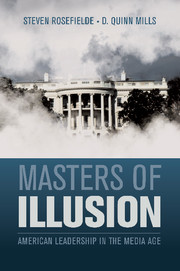Book contents
- Frontmatter
- Contents
- List of Tables and Figures
- Preface
- Acronyms
- Executive Summary
- Acknowledgments
- PART I NATIONAL SECURITY IN THE NEW AGE
- PART II AMERICAN PUBLIC CULTURE AND THE WORLD
- PART III AMERICAN PUBLIC CULTURE AND OURSELVES
- PART IV THE RECONFIGURATION OF NATIONAL WEALTH AND POWER
- PART V VORTEXES OF DANGER
- PART VI THE AMERICAN RESPONSE
- PART VII LEADING TOWARD PEACE
- 15 The Dangers of Overreach
- 16 The Transatlantic Trap
- 17 The Middle Course
- PART VIII AMERICAN PRESIDENTIAL LEADERSHIP
- Notes
- Glossary
- Bibliography
- Index
15 - The Dangers of Overreach
Published online by Cambridge University Press: 31 July 2009
- Frontmatter
- Contents
- List of Tables and Figures
- Preface
- Acronyms
- Executive Summary
- Acknowledgments
- PART I NATIONAL SECURITY IN THE NEW AGE
- PART II AMERICAN PUBLIC CULTURE AND THE WORLD
- PART III AMERICAN PUBLIC CULTURE AND OURSELVES
- PART IV THE RECONFIGURATION OF NATIONAL WEALTH AND POWER
- PART V VORTEXES OF DANGER
- PART VI THE AMERICAN RESPONSE
- PART VII LEADING TOWARD PEACE
- 15 The Dangers of Overreach
- 16 The Transatlantic Trap
- 17 The Middle Course
- PART VIII AMERICAN PRESIDENTIAL LEADERSHIP
- Notes
- Glossary
- Bibliography
- Index
Summary
The public culture of America causes our leaders to find it difficult to defend ourselves in a moderate manner. Historically, we either retreat behind our ocean barriers, or we embark on crusades to remake the world. America focuses on our internal concerns, or we try to rebuild the globe in our image. This dynamic is now reemerging in our country. Our politics may soon be dominated by proponents of each: on the one side, Republicans pressing for a militarily dominant America overreaching itself by trying to remake the world; on the other side Democrats pressing for an underreaching America retreating into reduced armament and multilateralism (we will see that disarmament and multilateralism are necessarily related). Either course is the wrong reach and would spell disaster.
OVERREACH
America as a Model for the World
President George W. Bush has thrust America onto a course of extending our system broadly in the world. At his speech at commencement at the U.S. Coast Guard Academy in 2003, President Bush said, “America's national ambition is the spread of free markets, free trade, and free societies. These goals are not achieved at the expense of other nations, they are achieved for the benefit of all nations. America seeks to expand, not the borders of our country, but the realm of liberty.” He quoted Woodrow Wilson to underscore the point: Bush quoted from Woodrow Wilson: “President Woodrow Wilson said, ‘America has a spiritual energy in her which no other nation can contribute to the liberation of mankind.
- Type
- Chapter
- Information
- Masters of IllusionAmerican Leadership in the Media Age, pp. 343 - 358Publisher: Cambridge University PressPrint publication year: 2006



